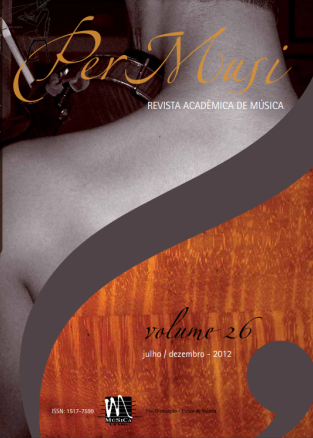A significação em Portais e a Abside, de Celso Loureiro Chaves
Palavras-chave:
Análise musical, Musicologia cultural, Música e sociedade, Celso Loureiro Chaves, Repertório brasileiro para violãoResumo
Neste artigo empreende-se a análise da obra Portais e a Abside, de Celso Loureiro Chaves, para violão solo, de 1997. A análise segue os princípios da nova musicologia, como têm sido postos em prática por autores como Lawrence Kramer e Rose Subotnik. O ponto de partida e permanente referência da análise são as evidências deixadas pelo próprio compositor.
Referências
AGAWU, Kofi. How We Got Out of Analysis, and How to Get Back In Again. Music Analysis, Oxford UK, v.23 Issue 2-3, p.267-286, 2004.
BENT, Ian. Analysis. Grove Publications, 1987.
BOULEZ, Pierre. Apontamentos de Aprendiz. São Paulo: Editora Perspectiva, 1995. Tradução de MOUTINHO, Stella; PAGANO, Caio; BAZARIAN, Lídia.
CHAVES, Celso Giannetti Loureiro. Portais e Abside. Goldberg Edições Musicais, 1997.
______. Portais e a Abside. Intérprete: Paulo Inda. In: Paulo Inda. I Paulo Inda. Porto Alegre: Secretaria Municipal da Cultura, FUMPROARTE, 2005. CD. Faixa XIV.
COOK, Nicholas. A Guide to Musical Analysis. R.S. Means Company, 1992.
DUNSBY, Jonathan e WHITTALL, Arnold. Music Analysis in Theory and Practice. Yale University Press, 1988.
FORTE, Allen. The Structure of Atonal Music. New Haven and London: Yale University Press, 1973.
KRAMER, Lawrence. Musical Meaning Toward a Critical History. Berkeley and Los Angeles: University of California Press, 2001.
______. Music as Cultural Practice. Berkeley and Los Angeles: University of California Press, 1990.
______. Musicology and Meaning. The Musical Times, v.144, n.1883, p.6-12, 2003.
NATTIEZ, Jean-Jacques. Etnomusicologia e significações musicais. Per Musi, Belo Horizonte, n.10, jul - dez, 2004, p. 5-30.
NETTO, J. Teixeira Coelho. Semiótica, Informação e Comunicação. São Paulo: Editora Perspectiva, 1980.
ROSA, Guimarães. Grande Sertão: Veredas. São Paulo: Abril Cultural, 1983. (Publicado sob licença da Livraria José Olympio Editora S.A., Rio de Janeiro)
SCHAEFFER, Pierre. Traité des objets musicaux – essai interdisciplines. Editions du Seuil, 1966.
______. Tratado dos objetos musicais: ensaio interdisciplinar. Tradução de Ivo Martinazzo. Brasília: Editora Universidade de Brasília, 1993.
SCHENKER, Heinrich. Five Graphic Music Analyses (Fünf Urlinie-Tafeln). New York: Dover Publications, Inc.,1969.
SCHOENBERG, Arnold. Style and Idea. Edited by Leonard Stein with translations by Leo Black. Berkeley and Los Angeles: University of California Press, 1984.
SUBOTNIK, Rose Rosengard. Developing variations: style an ideology in Western music. Minneapolis: University of Minnesota Press, 1990.
Downloads
Publicado
Edição
Seção
Licença

Este trabalho está licenciado sob uma licença Creative Commons Attribution 4.0 International License.

Exceto onde está indicado, o conteúdo neste site está sob uma Licença Creative Commons - Atribuição 4.0 Internacional.












